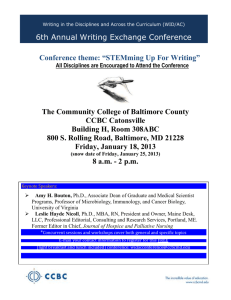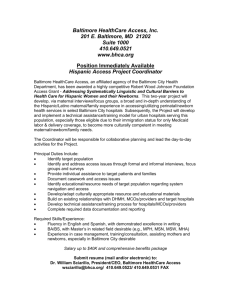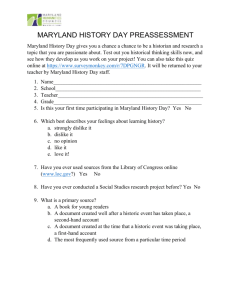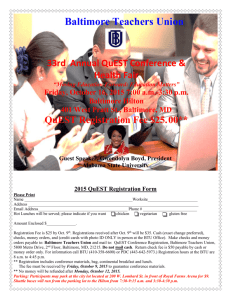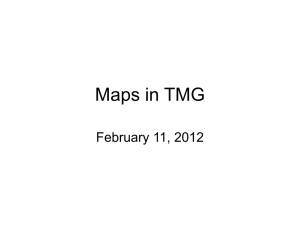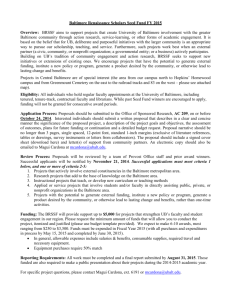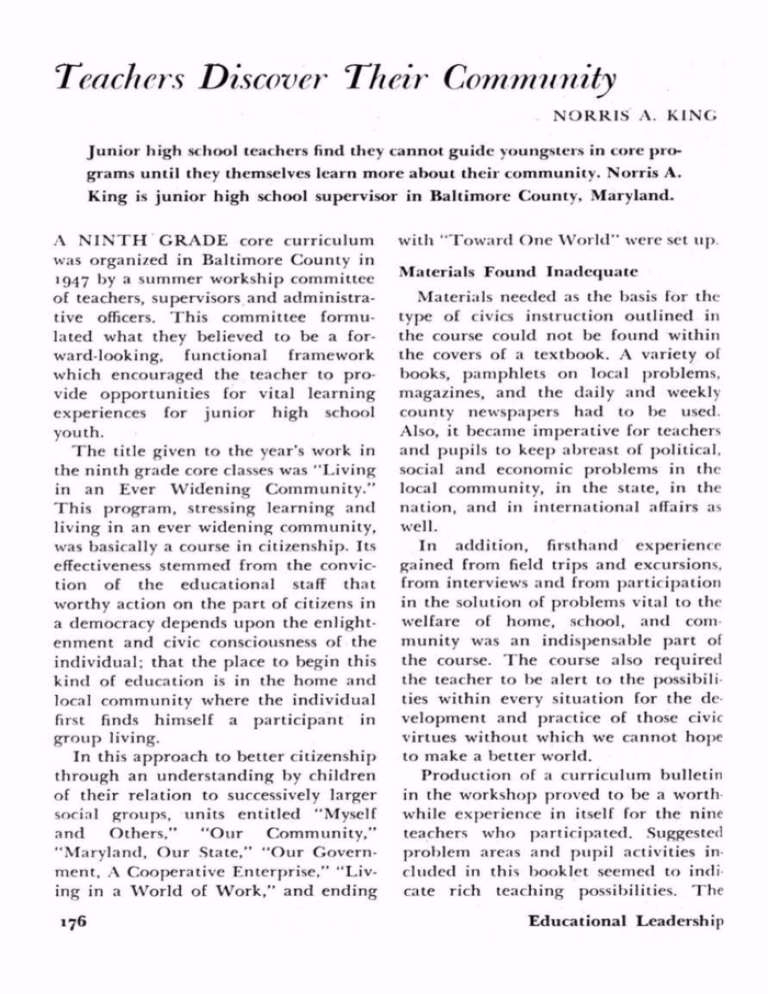
Teachers Discover Their Community
MORRIS A. KING
Junior high school teachers find they cannot guide youngsters in core pro
grams until they themselves learn more about their community. Norris A.
King is junior high school supervisor in Baltimore County, Maryland.
A NINTH GRADE core curriculum
was organized in Baltimore County in
1947 by a summer workship committee
of teachers, supervisors and administra
tive officers. This committee formu
lated what they believed to be a for
ward-looking, functional framework
which encouraged the teacher to pro
vide opportunities for vital learning
experiences for junior high school
youth.
The title given to the year's work in
the ninth grade core classes was "Living
in an Ever Widening Community."
This program, stressing learning and
living in an ever widening community,
was basically a course in citizenship. Its
effectiveness stemmed from the convic
tion of the educational staff that
worthy action on the part of citizens in
a democracy depends upon the enlight
enment and civic consciousness of the
individual; that the place to begin this
kind of education is in the home and
local community where the individual
first finds himself a participant in
group living.
In this approach to better citizenship
through an understanding by children
of their relation to successively larger
social groups, units entitled "Myself
and Others," "Our Community,"
"Maryland, Our State," "Our Govern
ment, A Cooperative Enterprise," "Liv
ing in a World of Work," and ending
.76
with "Toward One World" were set up.
Materials Found Inadequate
Materials needed as the basis for the
type of civics instruction outlined in
the course could not be found within
the covers of a textbook. A variety of
books, pamphlets on local problems,
magazines, and the daily and weekly
county newspapers had to be used.
Also, it became imperative for teachers
and pupils to keep abreast of political,
social and economic problems in the
local community, in the state, in the
nation, and in international affairs as
well.
In addition, firsthand experience
gained from field trips and excursions,
from interviews and from participation
in the solution of problems vital to the
welfare of home, school, and com
munity was an indispensable part of
the course. The course also required
the teacher to be alert to the possibili
ties within every situation for the de
velopment and practice of those civic
virtues without which we cannot hope
to make a better world.
Production of a curriculum bulletin
in the workshop proved to be a worth
while experience in itself for the nine
teachers who participated. Suggested
problem areas and pupil activities in
cluded in this booklet seemed to indi
cate rich teaching possibilities. The
Educational Leadership
teachers were most enthusiastic about
the proposed two-period core which in
tegrated citizenship training, English,
literature and guidance. But a wellwritten curriculum bulletin does not
necessarily lead to a successful program
in the classroom. We soon discovered
that something was missing in our pro
gram and we met together to find what
that something might be.
Need for Knowledge of County
and State
The teachers were quite frank. They
admitted difficulty in getting informa
tion; they conceded that they had not
had enough firsthand experience in
community life. They acknowledged
they did not know enough about places
for field trips and excursions. They
realized they did not know many per
sons qualified to give interviews con
cerning community problems and pos
sible solutions. Actually, the teachers
identified one of their problems with
out too much difficulty they needed a
more intimate knowledge of our county
and state. The next step was to do
something about the situation.
Community Study Program
Inaugurated
Outcome of the meeting was the de
cision to set up a community study
course for the ninth grade core teachers.
A representative teacher from each
school was asked to meet with the
supervisor and together the group set
up a tentative list of exploratory ex
periences. In each case the criterion
used in deciding upon an activity was,
what do we teach in our classes that we
need to know more about?
Purposes of this program were:
December, 1950
To help the core teachers acquire
a more intimate knowledge of our
community and state.
To help the teachers become ac
quainted with people who are com
munity resources because of their
varied interests and work in special
ized fields.
To provide experiences for teachers
in the use of community resources
that they might wish to utilize with
their classes.
To give teachers experiences in plan
ning field trips.
In order to schedule this course in
the long-range calendar of meetings
and events for the school year 1949-50,
the days and the hours had to be set
definitely in advance.
One provision of the course was for
partial credit toward the renewal of
teaching certificates. Also there was the
possibility that an entire summer
school requirement might be com
pleted through three years of this type
of work. Suitable persons were supplied
by the principals to relieve teachers
from any classes which might be sched
uled during the time of the meetings.
The only expenses in connection with
the course were for bus transportation
for the Baltimore County tour, the
Annapolis tour and the Conservation
tour.
Principals, too, had a stake in this
venture. We needed their cooperation
and assistance. Therefore a letter was
sent to each principal explaining the
purposes of the course, suggesting ways
of relieving teachers without employ
ment of substitutes, and stating that
the final decision concerning requests
from teachers to enroll rested with him.
Year's Program Set Up
Questionnaires were sent to teachers
and it was found that all but two were
eager to participate. The course was
started with an orientation meeting
and as a result of our discussions the
program for the year was set up. Par
ticipating teachers listed the kinds of
experiences they wished. It was the task
of the writer to plan with individual
teachers who had special knowledge
about these events. The following
events scheduled throughout the year
from October to April grew out of this
planning:
Tour of Baltimore County. Purpose:
To show what historical, educational
and industrial centers influence life in
our county; to show rural and urban
differences in our county; and to show
the varying topography of Baltimore
County.
Tour of Annapolis. Purpose: to visit
some historical homes of the Maryland
colonial period; to visit educational
centers that influence Maryland life;
and to learn of the structure of our
state government.
Tour of Baltimore County Court
House. Purpose: To show how our
community is governed.
Tour of City Hall. Purpose: To show
how Baltimore City is governed.
Visit to Baltimore City Traffic Court.
Purpose: To acquire firsthand knowl
edge about one of our serious com
munity problems.
Visit to the Maryland Historical So
ciety. Purpose: To learn of our histori
cal background.
Panel
Discussion "Services
Per
formed by the Baltimore County Gov
ernment." Purpose: To learn of the
178
service performed by the Health, Pro
bation, Welfare, and Educational De
partments. Participants: Baltimore
County Health Officer; Director of
Baltimore County Probation Depart
ment; Director of Baltimore County
Welfare Board; and Superintendent of
Baltimore County Schools.
Panel
Discussion "Services
Per
formed by the Baltimore County Gov
ernment." Purpose: To learn of the
services performed by the Baltimore
County Planning Commission, Recre
ational Department, Bureau of Public
Works, and Zoning Department. Par
ticipants: Director of the Planning
Commission; Director of the Recrea
tional Department; Director of the Bu
reau of Public Works; and Zoning
Commissioner.
Visit to the Maryland Legislature at
Annapolis. Purpose: To observe the
state legislature in action.
Tour of Baltimore City Slum Area.
Purpose: To learn of the housing prob
lems in our community and to learn of
the steps being taken to improve hous
ing in our community.
Tour of Baltimore Harbor. Purpose:
To find what industries provide work
for people in our community, to learn
of the movement of materials into and
out of our community and to learn of
other sections of the country and the
world with which we trade.
Panel Discussion "Industrial Balti
more County." Purpose: To find out
what industries provide work for peo
ple in our community and to learn of
the job possibilities for high school
graduates in the industries of our com
munity. Participants: Representatives
from Bethlehem Steel Company, Glenn
L. Martin Company, Black and Decker
Educational Leadership
Manufacturing Company, and Bendix
Radio Company.
Conservation tour of Baltimore
County. Purpose: To learn of the dif
ferent kinds of agriculture carried on
in our county and to learn of steps be
ing taken in our county to combat soil
erosion. Guide and consultant: District
Coriservationist for Baltimore, Cecil
and Howard counties.
EVALUATING THE PROGRAM
Several evidences seem to indicate
the value of this program. The group
has a unity that was not in evidence
at the beginning of the year, and the
teachers are anxious to meet together
to continue this type of work for an
other year. We have accumulated a
great deal of vital information. After
each event a summary was written by
two teachers. These summaries and lec
ture notes were duplicated and dis
tributed. Governmental agencies and
industrial concerns have been most
liberal in supplying additional infor
mation once they have learned of our
problem.
Our teachers have met personally
many people who have specialized in
formation about the life and problems
of our county and state. They now
know many of the people who can
assist their classes when expert knowl
edge is needed.
This group has also had experience
in planning field trips. Many of the
tours made by the group have been
repeated by individual teachers and
their classes. These teachers have ac
quired a feeling of adequacy in dealing
with current problems, since they now
have a more complete picture of our
community life and of additional reDecember, 1950
sources to draw upon in their class
room instruction.
Planning for Next Year
The group felt that this type of work
should be continued. As an outgrowth
of this concern, each school was asked
to send a representative teacher to a
meeting to plan the activities for the
following year. Again we asked our
selves the question what kind of
things are coming up in our ninthgrade core classes that we need to know
more about?
The group members suggested that
we should emphasize three areas. They
felt that they lacked knowledge about
the western part of our state. They sug
gested, instead of a trip planned for a
day, a week-end tour of this section of
our state and they had many sugges
tions for our itinerary. Also, they
wanted to know more about the serv
ices performed by our state government
and again they had suggestions for ac
tivities in this area.
Further, the group members wanted
to know more about the work done by
private organizations and the state and
county governmental agencies for
handicapped groups, delinquents, and
the like. Suggestions concerning things
for the group to do in this area were
numerous.
Values Derived from the Program
As a result of this experience we have
found that teachers are willing to use
their own time for in-service programs
if they are brought into the planning of
activities that will help them in their
classroom work. Principals are willing
to make special arrangements in their
schools so their teachers may partici»79
pate in these programs if they are con
sulted before final plans are made and
if they can see values being derived
from them.
We have found also that a program
such as the one described in this article
can be operated without great expense
to the participating teachers or to the
Board of Education. Governmental
agencies, industry, and community re
source persons are more than willing
to render assistance without charge to
the group. When teachers become ac
tively interested in the community they
help public relations. Many of the per
sons who were called in to participate
in our programs commented very favor
ably on the teachers' questions, on their
enthusiasm, and on their varied in
terests.
The above conclusions are based on
experiences in one county. You may
find that they hold for other situations
as well, if you are considering a com
munity study program for your
teachers.
Christmas on
their minds?
WHATEVER YOUR GROUP IS THINKING ABOUT
TODAY. . . OR ANY DAY. . .
MOR-PLA JUMBO-BLOX SET THE SCENE
FOR SOCIAL AND DRAMATIC PLAY
The big hollow blox that interlock . . . build full,
child-size articles quickly, with minimum teacher
help! Set the scene for any project . . . use them
from nursery right on up through primary grades
. . . Mor-Pla Blox hold interest all the way! Solve
the problem of how to get most play value from
your equipment . . . choose MOR-PLA!
For Complete Information Write to —
it
I nexpensive!
No. 4 Basic Unit
is only '24!
ISO
R.H. STONE PRODUCTS
P O
BOX 414
Detroit 31
Mi
Educational Leadership
Copyright © 1950 by the Association for Supervision and Curriculum
Development. All rights reserved.

